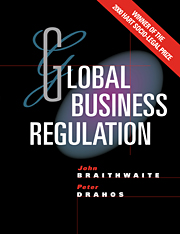7 - Property and Contract
Published online by Cambridge University Press: 04 August 2020
Summary
This chapter outlines the history of the globalization of the law of property and contract. These two are treated together because, arguably, together they form the foundation of a private law-based system of commerce. Property law constitutes the objects of property; contract enables the exchange of those objects. Through contract the objects of property become capital. The focus is on the way the principles of property and contract have harmonized, or not, as the case may be. The influence of Rome, through its jurists and their writings, has been crucial.
First, we must place some boundaries for the chapter. Early in their studies law students are disabused of the notion that property is a thing. Modern jurisprudential wisdom holds that property is a set of relations between individuals, those relations being constituted in terms of rights and duties. This is true. It is also true that these rights and duties relate to things. A's duty not to trespass on B's land is a duty A owes to B in relation to a thing. It is a mistake to uncouple what Pollock calls the ‘thinglikeness’ of property from the rights and duty relations of property. They are what make property comprehensible as an institution. It is property that determines who may have access to things and under what conditions - who, in other words, may use what resources.
Property can be divided into real property (basically land) and personal property. We say little about real property and a lot about personal property. The regulation of land has not been subject to the same pressures for international harmonization that we will see in the case of personal property forms and contract. Money, goods, shares, negotiable instruments of various kinds, copyright and patents are all examples of personal property. Roman private law drew a distinction between corporeal things and incorporeal things. In the Institutes of Gaius and the Institutes of Justinian, which simply follow Gaius in this respect, the distinction is between what can be touched and what cannot, the tangible and the intangible (Justinian's Institutes, 533 AD: 2.2). This distinction is still found in modern common law and civil systems. This chapter's main focus is on intangible property forms or, putting it another way, property rights in abstract objects.
- Type
- Chapter
- Information
- Global Business Regulation , pp. 39 - 87Publisher: Cambridge University PressPrint publication year: 2000



